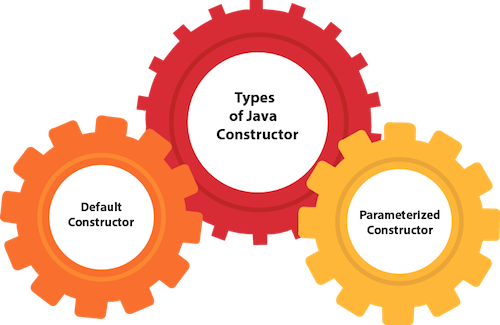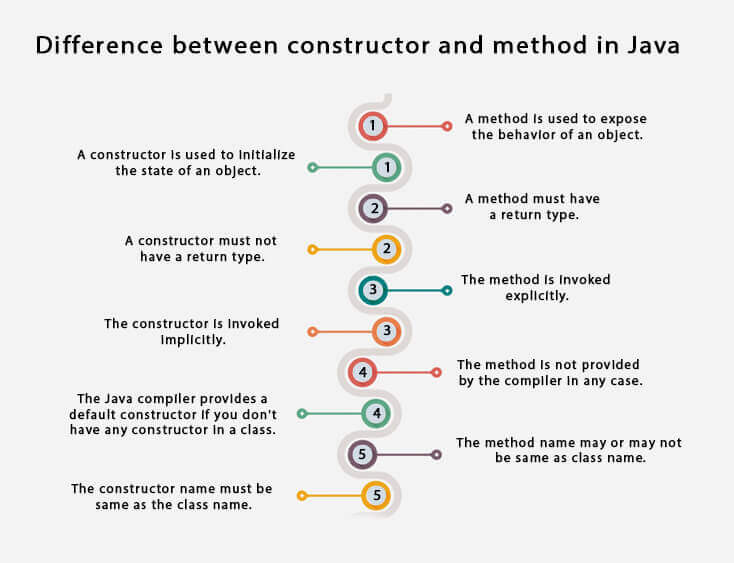| layout | title | parent | nav_order |
|---|---|---|---|
default |
Constructors |
Oops Concept |
4 |
In Java, a constructor is a block of codes similar to the method. It is called when an instance of the class is created. At the time of calling constructor, memory for the object is allocated in the memory.
It is a special type of method which is used to initialize the object.
Every time an object is created using the new() keyword, at least one constructor is called.
It calls a default constructor if there is no constructor available in the class. In such case, Java compiler provides a default constructor by default.
There are two types of constructors in Java: no-arg constructor, and parameterized constructor.
Note: It is called constructor because it constructs the values at the time of object creation. It is not necessary to write a constructor for a class. It is because java compiler creates a default constructor if your class doesn't have any.
There are two rules defined for the constructor.
1. Constructor name must be the same as its class name
2. A Constructor must have no explicit return type
3. A Java constructor cannot be abstract, static, final, and synchronized
There are two types of constructors in Java:
- Default constructor (no-arg constructor)
- Parameterized constructor
A constructor is called "Default Constructor" when it doesn't have any parameter.
Example of default constructor In this example, we are creating the no-arg constructor in the Bike class. It will be invoked at the time of object creation.
class Bike1{
//creating a default constructor
Bike1(){System.out.println("Bike is created");}
//main method
public static void main(String args[]){
//calling a default constructor
Bike1 b=new Bike1();
}
}Output
Bike is created
Example of default constructor that displays the default values
class Student3{
int id;
String name;
//method to display the value of id and name
void display(){System.out.println(id+" "+name);}
public static void main(String args[]){
//creating objects
Student3 s1=new Student3();
Student3 s2=new Student3();
//displaying values of the object
s1.display();
s2.display();
}
} Output
0 null
0 null
A constructor which has a specific number of parameters is called a parameterized constructor.
The parameterized constructor is used to provide different values to distinct objects. However, you can provide the same values also.
Example of parameterized constructor
In this example, we have created the constructor of Student class that have two parameters. We can have any number of parameters in the constructor.
class Student4{
int id;
String name;
//creating a parameterized constructor
Student4(int i,String n){
id = i;
name = n;
}
//method to display the values
void display(){System.out.println(id+" "+name);}
public static void main(String args[]){
//creating objects and passing values
Student4 s1 = new Student4(111,"Karan");
Student4 s2 = new Student4(222,"Aryan");
//calling method to display the values of object
s1.display();
s2.display();
}
} Output
111 Karan
222 Aryan
In Java, a constructor is just like a method but without return type. It can also be overloaded like Java methods.
Constructor overloading in Java is a technique of having more than one constructor with different parameter lists. They are arranged in a way that each constructor performs a different task. They are differentiated by the compiler by the number of parameters in the list and their types.
class Student5{
int id;
String name;
int age;
//creating two arg constructor
Student5(int i,String n){
id = i;
name = n;
}
//creating three arg constructor
Student5(int i,String n,int a){
id = i;
name = n;
age=a;
}
void display(){System.out.println(id+" "+name+" "+age);}
public static void main(String args[]){
Student5 s1 = new Student5(111,"Karan");
Student5 s2 = new Student5(222,"Aryan",25);
s1.display();
s2.display();
}
} Output
111 Karan 0
222 Aryan 25
| Java Constructor | Java Method |
|---|---|
| A constructor is used to initialize the state of an object. | A method is used to expose the behavior of an object. |
| A constructor must not have a return type. | A method must have a return type. |
| The constructor is invoked implicitly. | The method is invoked explicitly. |
| The Java compiler provides a default constructor if you don't have any constructor in a class. | The method is not provided by the compiler in any case. |
| The constructor name must be same as the class name. | The method name may or may not be same as the class name. |
There is no copy constructor in Java. However, we can copy the values from one object to another like copy constructor in C++.
There are many ways to copy the values of one object into another in Java. They are:
-By constructor -By assigning the values of one object into another -By clone() method of Object class
In this example, we are going to copy the values of one object into another using Java constructor.
class Student6{
int id;
String name;
//constructor to initialize integer and string
Student6(int i,String n){
id = i;
name = n;
}
//constructor to initialize another object
Student6(Student6 s){
id = s.id;
name =s.name;
}
void display(){System.out.println(id+" "+name);}
public static void main(String args[]){
Student6 s1 = new Student6(111,"Karan");
Student6 s2 = new Student6(s1);
s1.display();
s2.display();
}
} Ouput
111 Karan
111 Karan

